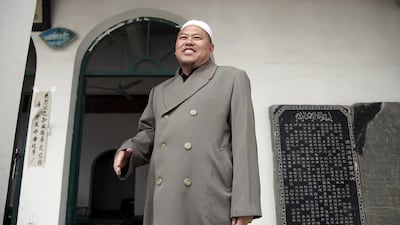HEFEI, China // The flood of anti-Muslim rhetoric on social media was the first sign of how fiercely the suburban middle-class homeowners in this central China city opposed a planned mosque in their area. It quickly escalated into something more sinister.
Soon a pig’s head was buried at the site of the future Nangang mosque, the culmination of a protest by dozens of residents. Then the mosque’s imam received a threatening text: “In case someone in your family dies, I have a coffin for you – and more than one, if necessary.”
“How did things get stirred up to this point?” the imam, Tao Yingsheng, said. “Who had even heard of the Nangang mosque before?”
The bitter fight over a mosque exemplifies how a surge in anti-Muslim sentiment online is spreading into communities across the country, exacerbating simmering ethnic and religious tensions that have led to bloodshed in the past. It is also posing a dilemma for the ruling Communist Party, which has allowed Islamophobia to fester online for years as part of its campaign to justify security crackdowns in its restive region of Xinjiang.
“It’s let the genie out of the bottle,” said James Leibold, a professor at La Trobe University in Australia who has tracked the growth of anti-Muslim hate speech on China’s internet.
A stone inscription outside its gate shows the original Nangang mosque was established in the 1780s by members of the Hui minority, the descendants of Silk Road traders who settled across China centuries ago. In its present form, the mosque has served the area’s 4,500 Hui for decades.
Over the past 10 years urbanisation has reconfigured Hefei’s landscape and its demographic flavour, and Hui leaders had been pushing to relocate their mosque to a more convenient urban location.
City planners in November finally selected a site adjacent to newly built upscale condominiums. The homeowners, overwhelmingly members of China’s ethnic Han majority, began complaining on Weibo, China’s popular microblog.
Some said the mosque would occupy space promised for a park, others warned that safety in the area would be compromised, but one homeowner, who identified himself only by his surname, Cheng, was more blunt. Han residents were uncomfortable that a centre for the Hui community would be less than 100 metres from their building, he wrote in a petition posted in December.
Ma Jianhua, a Nangang district planning official, said construction of the mosque would proceed after his office “appropriately handled” homeowners’ petitions, but declined to elaborate.
The mosque dispute is just the latest flashpoint for an increasingly active anti-Muslim social media movement in China.
A video of a Hui girl reciting the Quran in Arabic sparked outrage last May over so-called terrorist infiltration of Chinese schools, prompting officials to announce a “strict ban” on religion on campuses. Online activists derailed a Hui official’s effort to regulate the halal food industry, arguing that religion was creeping into the officially atheistic Chinese state.
Han Chinese, who make up 95 per cent of the population, have long grumbled about the dozens of China’s officially recognised minority groups receiving advantages on the hyper-competitive college entrance exams or exemptions from state limits on family size, but online abuse has increasingly targeted Muslims.
The rise in Islamophobia comes as Chinese have been buffeted by news of militant attacks in Europe, while at home, violence in Xinjiang and elsewhere has been blamed on Muslim separatists. Beijing has responded to the bloody, years-long insurgency from Muslim Uighur minorities in Xinjiang with further restrictions on Islamic expression, a move rights groups warn could radicalise moderate Muslims. Such policies have also drawn vows of retaliation from ISIL and Al Qaeda.
Ethnic hostility can only deepen, scholars say, when the government stops discussion of the plight of Muslims or ethnic policies while allowing anti-Muslim rhetoric and hate speech to go unchecked.
In 2014, Uighur scholar Ilham Tohti, who had founded a website to host debates about ethnic tensions in Xinjiang, was sentenced to life in prison on separatism charges.
Government censors go after descriptions of abuses against Muslims, but “it doesn’t take long whatsoever to find incredibly Islamophobic things that seem to be not censored at all,” said William Nee, China researcher at Amnesty International, which has appealed for Tohti’s release.
Political observers say the recent rise of a faction within the Communist Party advocating for a hardline approach on religious affairs has coincided with the rise of government-linked commentators who openly warn about the danger of Islam.
“Interest groups have actively promoted Islamophobia in interior regions in order to create a nationwide environment that justifies Xinjiang’s antiterrorism campaign,” said Ma Haiyun, a history professor specialising in China’s Muslims at Frostburg State University in Maryland. “There’s an Islamophobic movement that aims at creating chaos and even conflicts at the local level.”
The Hui community in Hefei are on the defensive after the mosque protest, with many eager to emphasise their desire to coexist peacefully with their Han neighbours as well as their confidence in the government’s handling of the situation.
But Mr Tao, the imam, seemed to acknowledge a hardening of attitudes toward Muslims in recent years.
“It may be that the situation has grown more sensitive in that place that we all know about,” he said after a pause, referring to but not daring to mention Xinjiang.
Still he tries to not harbour resentment toward the Han protesters.
“I don’t blame the locals because I believe they were influenced,” he said, sitting below framed pictures of him greeting government religious affairs officials. “I want them to know Muslims are virtuous people. We are peaceful. We are reasonable. We are tolerant. And we are good Chinese.”
* Associated Press

